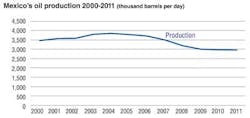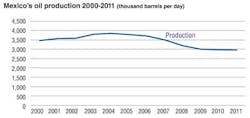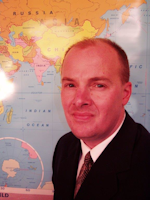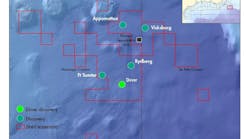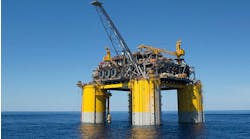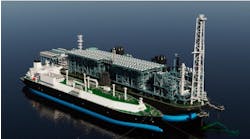Bruce Beaubouef
Managing Editor
Exploration and production work in theGulf of Mexico is expected to be robust this year, as drilling activities ramp up and a number of field development projects come online as planned.
Deepwater drilling activity will continue to rise, with the number of deepwater rigs in the Gulf expected to reach 60 by 2015. According to RigLogix, 12 floating rigs are expected to begin work in the US Gulf in 2014, including the Ocean Confidence, which has been working offshore West Africa; and the Discoverer Americas, which is expected to return to the GoM from work off East Africa.
The other semisubmersibles and drillships due to start work in the US Gulf in 2014 are currently under construction, and reportedly include:
- Maersk Drillship TBN 1
- Ocean BlackHornet
- Sevan Louisiana
- Deepwater Invictus
- Noble Bob Douglas
- Noble Sam Croft
- Pacific Sharav
- Rowan Resolute
- Maersk Drillship TBN 2
- West Neptune.
In 2015, two newbuild rigs,Noble Tom Madden, currently under construction at Hyundai Heavy Industries in Ulsan, South Korea, and Rowan Renaissance, also under construction at Ulsan in South Korea, are expected to begin work in the GoM, according to RigLogix.
Rowan Renaissance is expected to work for Repsol YPF in the Gulf starting in March 2015 following work offshore West Africa. The Noble Tom Madden, which is scheduled to leave the shipyard in late October 2014, is expected to go to work for Plains Exploration in the US Gulf in February 2015.
Analysis of rig availability for the Gulf gives evidence of the demand for drilling equipment in 2014 and 2015. According to IHS Petrodata, floating rigs in the US Gulf are essentially booked for 2014, with 98.5% of available drillship days and 82.3% of available semi days already locked up. This data indicates that operators still looking to drill deepwater programs in 2014 may need to sublet from another operator or bring in a rig from elsewhere, says Cinnamon Odell, rig analyst with IHS Petrodata. She notes that looking to 2015, 91.2% of available drillship days are already booked. "However, a solid chunk of semi time remains on the table with only 44.7% of the days already committed," Odell observed. "If operators' drilling programs are flexible enough to take a semi instead of a drillship, just over half of the available days in 2015 remain uncommitted."
With regard to jackups, 37.7% of US Gulf jackup days are already booked for 2014. According to Odell, this demonstrates "a turn from the historic spot-market to more of a term market, as operators continue to sign up rigs for several months to a year at a time, instead of just one or two wells at a time."
In addition, while only 1.2% of available days in 2015 are contracted, this is a break from past years, when the US Gulf traditionally did not have contracts booked that far in advance. This suggests the continuing strength of the US Gulf jackup market in terms of contracted backlog.
In November, BP announced that it had added two drilling rigs to thedeepwater Gulf of Mexico, bringing its fleet to a company record nine rigs as it continues to develop its strong portfolio of assets in the region.
One of the rigs, a new ultra-deepwater drillship known as theWest Auriga, is under long-term contract to BP from Seadrill Ltd. The vessel can operate in up to 12,000 ft (3,658 m) of water and is doing development drilling at BP's Thunder Horse field.
The other is a reconstructed drilling rig on BP's Mad Dog production platform. It replaces the original rig on the platform that was badly damaged and left inoperable by Hurricane Ike in 2008. With the new, state-of-the art rig, the platform recently resumed development drilling at the massive Mad Dog field complex.
BP says it anticipates investing on average at least $4 billion in the GoM each year for the next decade. The company plans to concentrate future activity and investment in the Gulf on growth opportunities around its four major operated production hubs - Thunder Horse, Na Kika, Atlantis, and Mad Dog - and three non-operated production hubs - Mars, Ursa, and Great White - in the deepwater, as well as on significant exploration and appraisal opportunities in the Paleogene and elsewhere.
BP also is advancing a pipeline of future development projects in the deepwater Gulf. In April, the company started up the Atlantis North expansion, the first of seven additional wells to be tied back to the existing Atlantis platform. At Na Kika, another field expansion is planned, following the successful startup last year of the Galapagos development, a subsea tieback to the Na Kika production facility. BP is pursuing plans for a second phase of the Mad Dog field.
The uptick in drilling activity has resulted in a number of deepwater discoveries, including Shell's over 100 MMboe discovery at the Vicksburg prospect at DeSoto Canyon block 393. Shell says the discovery would add to the 500 MMboe of potentially recoverable resources already found at the nearby Appomattox discovery.
Successful exploration of the Lower Tertiary has led to several large discoveries; and that, along with new technologies that enable such reserves to be developed, is part of the reason why the market is growing so quickly. One analyst estimates that as many as 20 wells may be needed for each large discovery, and that as much as $16 billion may be spent on adding new rigs to meet the increased drilling demand by 2015.
The Lower Tertiary play is also expected to drive long-term production growth in the deepwater Gulf, with an expected $50 billion in development capital expenditure to be spent through 2020, according to Wood Mackenzie.
The forecasting firm estimated that Lower Tertiary production in 2013 would be 113,000 boe/d, roughly 8% of regional production. By 2028, the play's production will outgrow the current leading subsalt Miocene play to roughly 41% of regional production, or 533,000 boe/d.
The Lower Tertiary play was first deemed commercial in 2002 following Shell's Great White (AC 857) discovery. Since then, a total of 15 commercial discoveries have been made, amounting to recoverable reserves of over 4 Bboe.
Wood Mackenzie expects operators to continue to map the extent of the Lower Tertiary play. Anadarko's Nansen Deep prospect could prove significant if commercial quantities of hydrocarbons are found, and BP's project at Gila is believed to be on trend with the massive Tiber discovery.
Oil production from the GoM will get a big boost if the production facilities currently scheduled to start-up through 2016 come onstream.
Seven platforms with a total production capacity of 715,000 b/d of oil are working toward first production, according to a Reuters tally. This would bring GoM total production to 2 MMb/d if the current 1.3 MMb/d holds.
In its count, Reuters noted that in 2014 Exxon Mobil plans to connect the Hadrian South field to Anadarko Petroleum's Lucius platform while deciding whether to build a platform at Hadrian North. BP should connect new Atlantis North wells to its Atlantis platform this year.
The platforms reported to be coming onstream through 2016 include Chevron's Jack/St. Malo and Big Foot; Shell's Olympus; Anadarko's Lucius and Heidelberg; Hess's Tubular Bells; and LLOG's Delta House.
Click here to viw the Status of US Gulf of Mexico deepwater discoveries pdf
